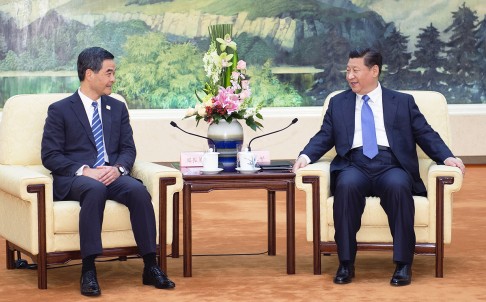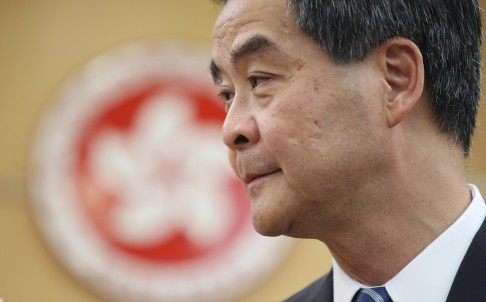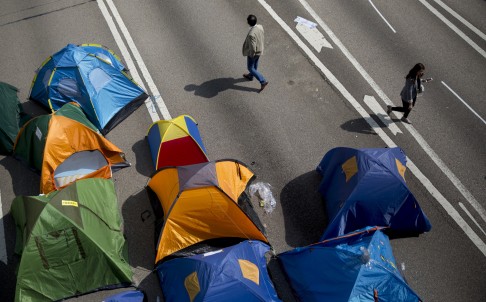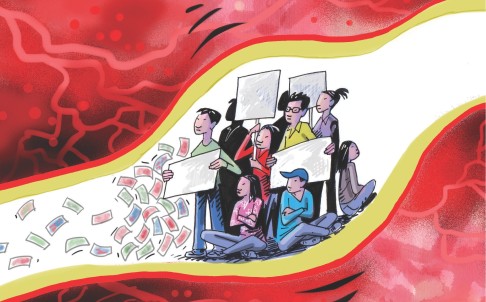Occupy Central
Occupy Central is a civil disobedience movement which began in Hong Kong on September 28, 2014. It calls on thousands of protesters to block roads and paralyse Hong Kong's financial district if the Beijing and Hong Kong governments do not agree to implement universal suffrage for the chief executive election in 2017 and the Legislative Council elections in 2020 according to "international standards." The movement was initiated by Benny Tai Yiu-ting (戴耀庭), an associate professor of law at the University of Hong Kong, in January 2013.
OCCUPY CENTRAL - DAY 45: Full coverage of the day’s events
All sides of the political divide must adhere to the law to move forward
PUBLISHED : Tuesday, 11 November, 2014, 5:13am
Chinese President Xi Jinping (right) meets with Leung Chun-ying in Beijing. Photo: Xinhua
On Sunday, President Xi Jinping and Chief Executive Leung Chun-ying met for the first time since the Occupy Central protests began some six weeks ago. The message from the meeting is clear. Beijing continues to support the city's leader and his governance according to the law. During a brief photo session for the media, Xi did not follow his predecessors in heaping praise on the chief executive. But a Xinhua report said the central government fully supported Leung and his administration. A source close to the Hong Kong government also said Xi cited a Chinese poem at the closed-door meeting to show his appreciation of Leung's loyalty and resilience during testing times. Separately, China yesterday announced that the scheme linking the stock markets in Shanghai and Hong Kong would be launched next week, a day after Leung raised the issue during the meeting. The green light is seen as yet another move to back the city's leader.
The endorsement for Leung is to be expected. It came at a time when the city is threatened by the gravest political challenge since the handover. It is imperative for Beijing to be seen as firmly behind the embattled chief executive. It also gives the clearest signal that Beijing will strictly adhere to the rule of law on the issue of political reform. Although Xi did not comment directly on the protests, he stressed the importance of the rule of law, the centerpiece in the latest Communist Party policy blueprint. He also reiterated the need for Hong Kong to "fully and accurately" understand the Basic Law, sparking concerns that it may impose tougher policies on the city.
The central government says it will resolutely support the Hong Kong government's efforts to safeguard the rule of law. Regrettably, the protesters' actions are not in line with that. They block the streets and defy court orders; they challenge the electoral framework decided by the highest state authority and insist on public nomination - a concept outside the Basic Law. The struggle is spilling over to the mainland, with some protest leaders trying to gatecrash Beijing after former chief executive Tung Chee-hwa turned down their request to arrange a meeting with state officials. The confrontational tactics will not end the impasse. It is clear Beijing will only allow Hong Kong to implement political reform according to its framework. The longer the protests drag on, the less likely democracy can be achieved. Adhering to the law is the only way forward.
This article appeared in the South China Morning Post print edition as Follow the law to move forward
If Hong Kong were better governed, would there be any need for democracy?
Kelly Yang says people rallying for democracy in Hong Kong really want strong leadership, as has been demonstrated in the corporate world
As Leung's approval ratings plummet, companies like Alibaba continue to attract shareholders who happily trade their cash for virtually no say in the company. Photo: Simon Song
Two blocks away from the protests for "one person, one vote", the Hong Kong stock exchange is quietly mulling over whether to abandon its "one shareholder, one vote" policy. Ironically, early this year, it was the exchange's insistence on democratic governance that lost Hong Kong the biggest IPO in history - the US$25 billion Alibaba listing - to New York.
HKEx's "one share, one vote" policy serves to safeguard shareholders' rights against entrenching power to a minority, in much the same way "one person, one vote" protects citizens. Yet, a growing number of companies, including Alibaba, Google and Facebook, are eschewing this democratic model in favour of dual-class shares, where some shares are weighted more heavily than others.
Dual-class shares, allowed on the New York Stock Exchange but not yet in Hong Kong, allow founders and vetted executives to keep control while still getting the public's money. This trend raises the question: Is democracy becoming a thing of the past?
Alibaba seems to think so. A group of 27 "partners" of the Chinese online commerce company has retained the exclusive right to nominate a majority of its board of directors even after it became a public company. Founder Jack Ma argues that in order for a company to "survive the long journey", it needed to be able to withstand the pressures of short-term gains that shareholders demand. To do that, it needed control.
Last month, Chief Executive Leung Chun-ying infamously tried to use similar logic in media interviews to defend the proposed 2017 nomination procedure for the chief executive. Unfortunately, the result of his speech was no soaring IPO.
As Leung's approval ratings plummet, companies like Alibaba continue to attract shareholders who happily trade their cash for virtually no say in the company. Why? And if it's possible for corporations to flourish in a structure in which shares and money are not king, is it then possible for a city to thrive when its people are not king?
Of course, there are glaring differences between companies and countries. Moreover, because governments affect people's fundamental rights, when something goes wrong, there's a lot more to lose. Currently in Hong Kong, there's a massive wealth gap, limited access to affordable housing and an education system that facilitates little upward mobility. That's a lot that needs to change.
However, if the success of tech IPOs tells us anything, it's that democracy is not the only way to bring about change. Non-democratic systems of governance can also bring lasting, favourable results.
Ultimately, what all successful companies and countries need - democratic or not - is strong leadership. That's why the Hong Kong people are protesting for democracy while the HKEx is thinking about scrapping it. The stock exchange has seen exceptional leaders who can deliver results to shareholders without democracy. The Hong Kong people, on the other hand, clearly haven't.
Kelly Yang is the founder of The Kelly Yang Project, an after-school programme for children in Hong Kong. She is a graduate of the University of California, Berkeley, and Harvard Law School.kelly@kellyyang.edu.hk
This article appeared in the South China Morning Post print edition as Results count
Urgent need to begin discussion on the details of electoral reform in Hong Kong
Sonny Lo says both officials and protesters must act to break deadlock
PUBLISHED : Tuesday, 11 November, 2014, 12:41pm
Without details on the electoral reform plan, any possible dialogue between the protesters and the government will be fruitless. Photo: Bloomberg
The stalemate between the Occupy movement and the Hong Kong and Beijing governments does not bode well. To break the impasse, all sides will need to act.
First, Beijing may have to push the SAR government to come up with a concrete political reform consultation document. This should include several aspects: the method for democratising the composition of the nominating committee (including, for example, a change from some corporate voters to a wider franchise); the relaxation of the criteria, thus allowing pan-democratic candidates to enter the first round of nomination; and the technical details of how the final two to three candidates would be chosen to contest the election through universal suffrage.
Without such details, any possible dialogue between student leaders and pan-democrats on the one hand and the government on the other will be fruitless.
The Hong Kong government will have to put forward the consultation document as soon as possible, together with an announcement that a public opinion assessment office will be set up to collect views on a reform model. This would necessitate the appointment of a director who can command trust and respect in society, and who would lead a team of pollsters conducting opinion surveys in an authoritative and independent manner.
The Hong Kong government should also consider an appropriate response to the democrats' demands about the development of the Legislative Council.
It can use the consultation document to deal with legislative reform in at least two aspects: establishing a consultative committee on Legco reforms as soon as possible, and a promise to consider introducing a bicameral legislature.
This should comprise a lower house composed of all directly elected seats and an upper house that includes functional constituency seats and also possibly members of the Chinese People's Political Consultative Conference and Hong Kong deputies to the National People's Congress. A bicameral legislature would be a possible way out of the impasse amid pan-democrats' demand to abolish functional constituencies in Legco.
Student leaders will have to moderate their demands as well, and be far more realistic. Instead of harping on the unrealistic request for the NPC Standing Committee to change its August 31 decision, they should get involved in discussion of the details of such reforms. "Institutional design" should be the motto of student leaders, rather than using slogans and claims that are politically unacceptable to Beijing.
Next, democrats should seek to persuade protesters in the three occupied zones - Admiralty, Mong Kok and Causeway Bay - to withdraw to parks and areas that will not constitute illegal occupation. This, alongside the government's move to accelerate the publication of a consultative document on political reform models, would hopefully foster a political atmosphere of trust.
Finally, the chief executive could consider dissolving Legco, in accordance with Article 50 of the Basic Law, which states that he can do so if the legislature does not pass "important bills". Given that executive-legislative confrontations of the recent past do not bode well for constructive dialogue between pan-democrats and the government, the chief executive could take the opportunity to call for a new round of elections that would usher in a new legislature.
This may in fact strengthen the government's hand: if fewer pan-democrat politicians were re-elected, the new legislature could well pass the government's proposed electoral reform model - a solution that would settle the ongoing dispute peacefully.
Sonny Lo is professor and head of the department of social sciences at the Hong Kong Institute of Education
This article appeared in the South China Morning Post print edition as Begin discussions now onthe details of electoral reform
End Occupy protests to give small businesses a chance to recover, before it's too late
Felix Chung calls on protesters to withdraw before their illegal occupation causes small businesses already suffering to retrench - a no-win situation for everyone in Hong Kong
PUBLISHED : Tuesday, 11 November, 2014, 6:17pm
At any time, cash flow is a major challenge for SMEs and microenterprises as they need to pay rent and wages.
It has now been more than a month since students and protesters began unlawfully occupying several main roads in Mong Kok, Causeway Bay and Admiralty.
There can be no doubt that the Occupy movement has caused significant damage to the Hong Kong economy. Those directly affected include the retail, tourism, catering and transport sectors, small and medium-sized enterprises as well as microenterprises. They are all now facing the most difficult conditions since the severe acute respiratory syndrome outbreak in 2003.
I very much respect protesters' right to voice their opinions. However, they should, at the same time, respect the rights of others - for example, road users - and take into account the interests of the general public.
Most importantly, they should respect the rule of law. Their protest has greatly affected the business sector and that will, in turn, affect the whole economic situation and competitiveness of Hong Kong, and ultimately the employment of local people.
The inconvenience caused by blockading roads has resulted in a decline in customer sentiment. In mid-October, the Hong Kong government said that the Commerce and Economic Development Bureau had met 20 commerce organisations or associations of different trades to better understand the impact of the Occupy movement.
According to the information gathered, SME retailers in the occupied areas have experienced a drop in business, of up to 80 per cent in some cases. Associations say some overseas clients have cancelled their business trips to Hong Kong, while exhibitors have withdrawn from exhibitions and conventions. All this has also affected hotel bookings and receipts at tourist attractions in some areas.
Meanwhile, a survey conducted by the HKSMEA business association has revealed that the majority of the SMEs said they had been affected or severely affected by the Occupy movement, while more than 60 per cent said daily turnover had dropped by 40 per cent or more. Average daily losses for each amounted to over HK$11,000 .
Moreover, the Hong Kong Taxi Association and the Federation of Hong Kong Kowloon New Territories Hawkers Associations both reported a drop in business for their members as a result of the protests, by about a third and 70 per cent respectively.
These figures show that SMEs and microenterprises are now on the edge of a precipice and cannot withstand the impact of the Occupy movement for much longer. At any time, cash flow is a major challenge for SMEs and microenterprises as they need to pay rent and wages.
If the current protests continue, they will inevitably affect the livelihood of frontline employees. Many of them may be the parents or family members of protesters on the street. It will be a no-win situation. Thus, students and protesters really must withdraw from the main roads in Mong Kok and Causeway Bay to give SMEs and microenterprises a chance to recover.
Although the overall impact of the Occupy movement will only be fully ascertained with the release of economic data in the next quarter, we can already see that the protests have had a negative impact on the special administrative region's international image and on investor confidence.
There have clearly been other effects as well. An official start date - November 17 - has finally been announced for the long-awaited Shanghai-Hong Kong cross-border share trading link. Although no official reason was given for the delay in Beijing's approval, many believe it was related to the political uncertainty brought about by the protests.
Financial Secretary John Tsang Chun-wah has warned that if the movement continued, the Hong Kong stock market could face a loss of confidence. He also said that the protests threatened the economy, government operations and the rule of law.
I hope students and protesters realise political stability is crucial to the city's economic development. The strong rule-of-law tradition is an important foundation stone of Hong Kong. Students and demonstrators should realise that their protests are breaking the law and thus also bringing enormous damage to the rule of law.
Now more than ever, they need to respect the rule of law and court orders, and withdraw from the streets for the sake of all Hong Kong.
Felix Chung Kwok-pan is a member of the Legislative Council and vice-chairman of the Liberal Party
This article appeared in the South China Morning Post print edition as Internal damage
Occupy Central leaders prepare to surrender as police make plans to clear sites
PUBLISHED : Wednesday, 12 November, 2014, 4:48am
Occupy Central co-founders (from left) Reverend Chu Yiu-ming, Professor Benny Tai, Chan Kin-man. Photo: EPA
Occupy Central co-founders tentatively plan to turn themselves in to police next week, the South China Morning Post has learned.
This comes as police sources say the force may begin executing from tomorrow the injunctions taken out against the Mong Kok and Admiralty sit-ins.
A core member of Occupy Central told the Post that the three organisers of the civil disobedience movement and its volunteers were planning to surrender to police on Friday next week, in an attempt to show that they were willing to accept the legal consequences of joining the "unlawful" pro-democracy protest.
"We will sit peacefully on the roads and let the police arrest us if the clearance starts earlier than Friday next week," the source said.
"We don't want to surrender before Monday - when the Hong Kong-Shanghai stocks 'through train' officially kicks off - as the last thing we want to do is to give [Chief Executive] Leung Chun-ying a chance to show Beijing that he can 'resume social order' as he promised [President] Xi Jinping ."
However, the deputy leader of the Federation of Students, Lester Shum, had some reservations. "The police are already planning to clear the sites," he said. "I would rather be arrested than surrender."
Acting Chief Executive Carrie Lam Cheng Yuet-ngor yesterday urged the protesters to leave the occupied sites as soon as possible, as police had already started preparations to execute the court orders.
"To uphold the rule of law, police are preparing to enforce the law, including making arrests," she said yesterday. "An injunction is a solemn order made by the court, which should be fully respected and strictly followed by all."
The three injunctions cover sections of Nathan Road, Mong Kok, and the space around Citic Tower in Admiralty, opposite government headquarters.
Under the court orders, protesters face arrest if they prevent bailiffs removing barricades.
Detectives from the elite organised crime and triad bureau, led by senior superintendent Brian Lowcock, had held day-long talks with the Department of Justice to discuss legal issues surrounding the implementation of the injunctions, according to a police source.
An application from two subsidiaries of private transport operator Kwung Chung Bus for further injunctions to eject protesters from the main Admiralty protest site on Harcourt Road was held up at the High Court yesterday. Mr Justice Thomas Au Hing-ching adjourned the case to next week so more evidence could be gathered.
The companies had argued that the blockading of parts of Connaught Road Central and Harcourt Road had hit their business, including school bus services.
Barrister Warren Chan SC, representing the bus companies, read letters from parents detailing how pupils had to wake up at 4.30am to catch school buses.
"The world has turned upside down" since the protest campaign began, Chan said, and parents and pupils were exhausted and suffering in "hell".
This article appeared in the South China Morning Post print edition as Protest leaders to surrender ... but not until next week





沒有留言:
張貼留言